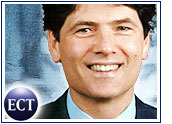
I saw a quote the other day from the CEO of a new hosted CRM company that really got me thinking. Describing his company’s introduction, he optimistically quipped, “The second mouse gets the cheese.”
What he meant was that now that the category is defined, it should be relatively easy for his company to gain market share. But in my experience, things rarely work that way. In fact, things tend to go in the other direction — the strongest early brands only get stronger. The way to combat that tendency in the market is to be different to diversify.
In my world, I have discovered that diversification is instinctive in children. I have been running the experiment and collecting data for more than a dozen years now, and it looks to me like the second child is a natural-born brand manager. Whatever numero uno does, number two will find a way to play a riff that differentiates him enough so that he gets noticed. Sometimes the effort is a conscious decision; sometimes, it’s pure instinct.
The phenomenon is easier to see in siblings of the same gender; otherwise, what really is kid-brand differentiation might sometimes be mistaken for a boy-versus-girl thing. It’s a great strategy, and kids know this without ever being taught.
So why do we forget it when we grow up?
Like Lizards on a Warm Rock
In business, we see too many examples of copycat positioning when a diversification strategy is called for — and I am not simply referring to the technology or the CRM markets.
About 10 years ago, there was an absolute market frenzy over premium beer. Remember that? One brewer, Samuel Adams, seized on the idea of using only two-row barley, imported hops, pure water, and nothing else — and soon imitators were as thick as lizards on a warm rock. What’s incredible is that all the imitators spread the same message, effectively proselytizing for Sam Adams instead of themselves.
In the end, the market consolidated around the brewer that first articulated the vision. The other guys were practically giving away their suds by the time it was all over. Through it all, no one challenged the leader with an alternate strategy, and no strong second brand emerged.
The ‘Un-Siebel’
Perhaps the best example of a well-executed second brand strategy I have ever seen happen in the CRM market over the last few years was executed by salesforce.com. While every other CRM vendor was competing head to head over who had the best CRM suite, salesforce played a different riff.
While all the other CRM vendors offered a client-server architecture and applications that were expensive and required a lot of effort to install, salesforce offered a Web-based product that was configurable but not customizable, and that showed fast results that were economical to get — things customers really cared about.
Salesforce.com’s marketing attack saw no Super Bowl ads; it was PR driven and leveraged a provocative tagline — “No software.” Most importantly, it cleverly positioned the company as everything un-Siebel.
It worked like a charm. Today salesforce.com stands alone as arguably the second most important brand in CRM, behind Siebel, and as the most important brand in hosted CRM, the category it pioneered. For its efforts, salesforce will have an IPO soon, and the company has many good ideas ahead of it.
Everyone else who tried to outmuscle Siebel now is hanging on with a few percentage points of the enterprise CRM market. And the hosted vendors that tried to copycat the original are looking for niches to exploit.
Getting the Cheese
So, back to the second mouse getting the cheese. I’d say it’s the wrong metaphor and the wrong strategy. To be clear, it’s not that the second mouse can’t get the cheese. It’s that the second mouse needs to be very lucky and hope the first mouse makes a misstep. Rather than depend on luck, the second mouse needs to be a keen observer of the market, asking hard questions like the following:
- What is it the first mouse is not doing well or ignoring?
- Is there another niche in the market that is opening up as a result of what numero uno is doing?
- How do I exploit this knowledge?
These are questions that should force us to look outside of the box. But all too often, the answers come from within the cozy confines of the space we already know, and the second mouse settles for a strategy of being 10% less expensive or proclaiming it offers higher performance — with limited success.
The hosted CRM market is not very old, and there are still only a handful of entrants. There is room in the market for more competitors if each will only concentrate on figuring out how to do something different. If you are the CEO and can’t figure out how just ask your second child.
Denis Pombriant is former vice president and managing director of Aberdeen Group’s CRM practice and founder and managing principal of Beagle Research Group. In 2003, CRM Magazine named Pombriant one of the most influential executives in the CRM industry.























































